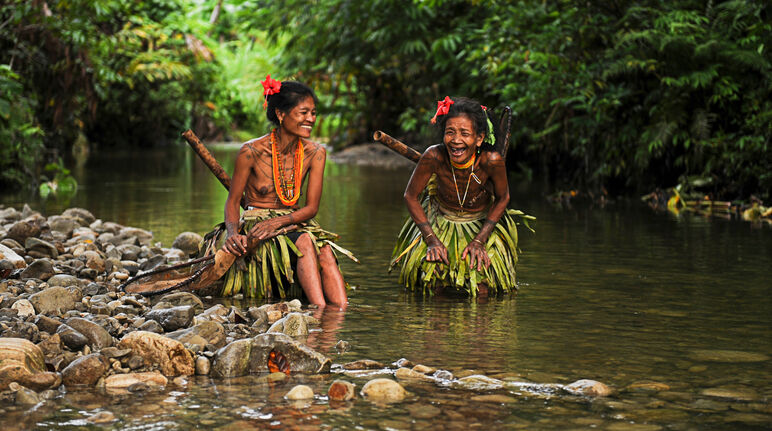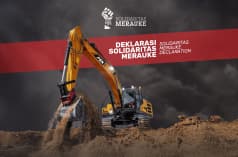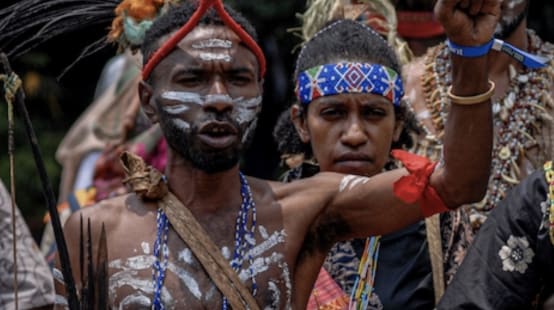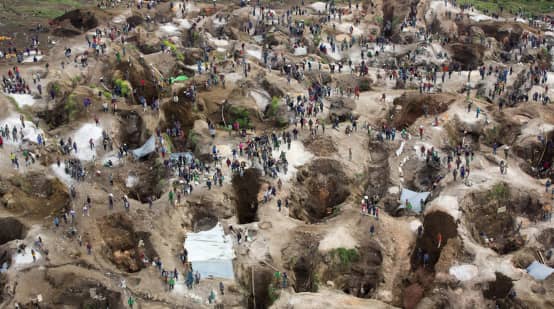Siberut: our forest is not your biomass!
 In harmony with nature: indigenous people on Siberut (© muslian/istockphoto.com)
In harmony with nature: indigenous people on Siberut (© muslian/istockphoto.com)
An energy company wants to cut down rainforest to make way for 20,000 hectares of biomass plantations on Siberut, one of the most enchanting islands of Indonesia. The project was recently put on hold after vehement protests by the indigenous people and international community – let's make sure that it is scrapped once and for all!
Call to actionTo: the Minister of Environment and Forestry, Dr. Siti Nurbaya Bakar; Mr. Franky Sibarani (Investment Coordinating Board)
“Deny PT Biomas Andalan Energi's application to clear Siberut’s forest for a biomass plantation.”
Aman climbs up the giant tree with a bamboo vessel for honey tied around his waist. The wiry man’s face lights up with joy as he listens to the buzzing of the bees, the call of the shama thrush and crackling of the twigs. “We inherited this forest from our ancestors,” he explains. The indigenous people of Siberut, an island off the west coast of Sumatra, live in harmony with nature.
“We successfully defended our forest against logging and palm oil companies,” says Aman with pride. “And now they want to burn it for electricity? No!”
Biomas Andalan Energi wants to clear 20,000 hectares of the forest and replace it with a biomass plantation. The wood grown there would then fuel a power plant.
The islanders are calling on us to unite against the plantation, which would otherwise wipe out the forest.
In September 2015, district governor Yudas Sabaggalet sent a letter to Biomas Andalan Energi and the Ministry of Forestry calling for the biomass company’s permit to be revoked. He has not yet received a response.
A ray of hope: Biomass Andalan Energi failed to meet the deadline for submitting its environmental impact analysis, leaving the future of the project uncertain. The decision is now in the hands of the Ministry of Forestry.
Please speak out for the indigenous people of Siberut in their struggle to save one of Indonesia’s last intact forest areas.
BackgroundSiberut: the indigenous people’s forest
Siberut (4,030 km²), the largest of the Mentawai Islands west of Sumatra, is characterized by tropical rainforest on hilly terrain, high rainfall, numerous rivers, marshland and mangrove forests in the east.
Until just a few years ago, the island had no roads. The islanders did not use metal or practice agriculture. To this day, they live in the forest in longhouses and maintain their ancestral culture.
Their traditional way of life is threatened by the influence of religion, commerce and modernity, yet their relationship with nature as the mother who gives everything in abundance remains. The islanders have a deep bond to to the earth: every bit of land has a unique spiritual and familial significance for them. The land belongs to the community, and decisions about its use are made jointly. Selling the land to outsiders would be completely out of the question.
A document by the Sumatran authorities in 1990 came to the conclusion: “The inhabitants of Siberut are very cautious in managing the forest. They use its products and create gardens, but never use fire, taking great care to protect the island’s nature.”
The first negative impact of the modern world was the introduction of firearms. Both outsiders and islanders began hunting birds and harvesting agarwood (Aquilaria) for the perfume industry.
Siberut: threats to the rainforest
The island’s indigenous people have been using and protecting the forest for centuries, if not millennia. In the 1970s, however, all of Indonesia’s woodlands were declared “state forests”. As a consequence, they quickly fell into the hands of timber, paper and palm oil companies. The first timber companies arrived on Siberut in the 1980s, but the indigenous population vehemently – and so far quite effectively – resisted the destruction of their forests.
The times are changing, however. On paper at least (Decree 2382 / Menhut-VI / BRPUK / 2015), the forests once again belong to the indigenous peoples, who recently have been able to assert their legal rights to “community forests”.
Nevertheless, the authorities and industry apparently consider themselves above the law and ignore the rights of the indigenous people. A new company, Biomas Andalan Energi, currently intends to clear 20,875 hectares of Siberut for a biomass plantation to produce fuel for electricity generation. The project has been approved by the Ministry of Forestry, but the local people and their elders, mayors and local politicians are resisting – so far without success.
The Mentawai Islands
The Mentawai Islands, which have been separated from Sumatra for the past 500,000 years, are home to numerous species found nowhere else – 90% of the mammals inhabiting the islands are endemic. No other islands of this size anywhere in the world feature as many endemic primates, such as Kloss’s gibbon (Hylobates klossii), the pig-tailed langur (Simias concolor), the Pagai Island macaque (Macaca pagensis), the Siberut macaque (Macaca Siberu) and the Mentawai langur (Presbytis Potenziani).
Despite their exotic appeal, lush rainforests, vibrant cultures of indigenous people and natural beauty, the islands do not attract many visitors. The islands are best-known among surfers for their breathtaking waves.
Biomas Andalan Energi
Biomas Andalan Energi was granted a permit to establish a biomass plantation in a former logging concession in northern and central Siberut. The forest there was logged selectively and is thus well-preserved. No logging has taken place since there since 2007. The primary forest is still mostly intact.
The Environment and Forestry Ministry approved the project in May 2015, and the Investment Coordinating Board gave its green light in March 2016. The district chief, however, is calling on the authorities to revoke the permit.
The company is apparently already planting fast-growing trees (Calliandra calothyrsus and Leucaena leucocephala) and eucalyptus – all species that are not native to Indonesia.
Biomas Andalan Energi belongs to the Kayubaka Group, a corporation that operates biomass plantations, wood processing facilities and biomass power plants on the Mentawai Islands.
Further reading
Rainforest Foundation Norway: Timber Plantations Threaten Mentawai's Forests
The New York Review of Books: The Great Biomass Boondoggle
To: the Minister of Environment and Forestry, Dr. Siti Nurbaya Bakar; Mr. Franky Sibarani (Investment Coordinating Board)
Dear Dr. Bakar, dear Mr. Sibarani,
Siberut is renowned for its beautiful nature and unique culture. Yet the primary forest and livelihood of the island’s indigenous people are threatened by planned biomass plantations. Such monocultures are detrimental to biodiversity, forest conservation and the global climate. Additional risks that would have a direct impact on Siberut include flooding, the drying out of rivers, and ultimately the marginalization and descent into poverty of the indigenous population.
You have granted Andalan Biomas Energi a permit to establish 20,875 hectares of plantations on the island for the production of biomass for electricity generation. This was done without the free, prior and informed consent of Siberut’s population.
Dr. Bakar, you have shown your determination to halt deforestation. Do not permit peripheral forests such as those of the Mentawai Islands to be destroyed. Please review the permit for the biomass plantation.
Do not sacrifice Siberut for the production of biomass.
Kind regards,













 Recent successes
Recent successes